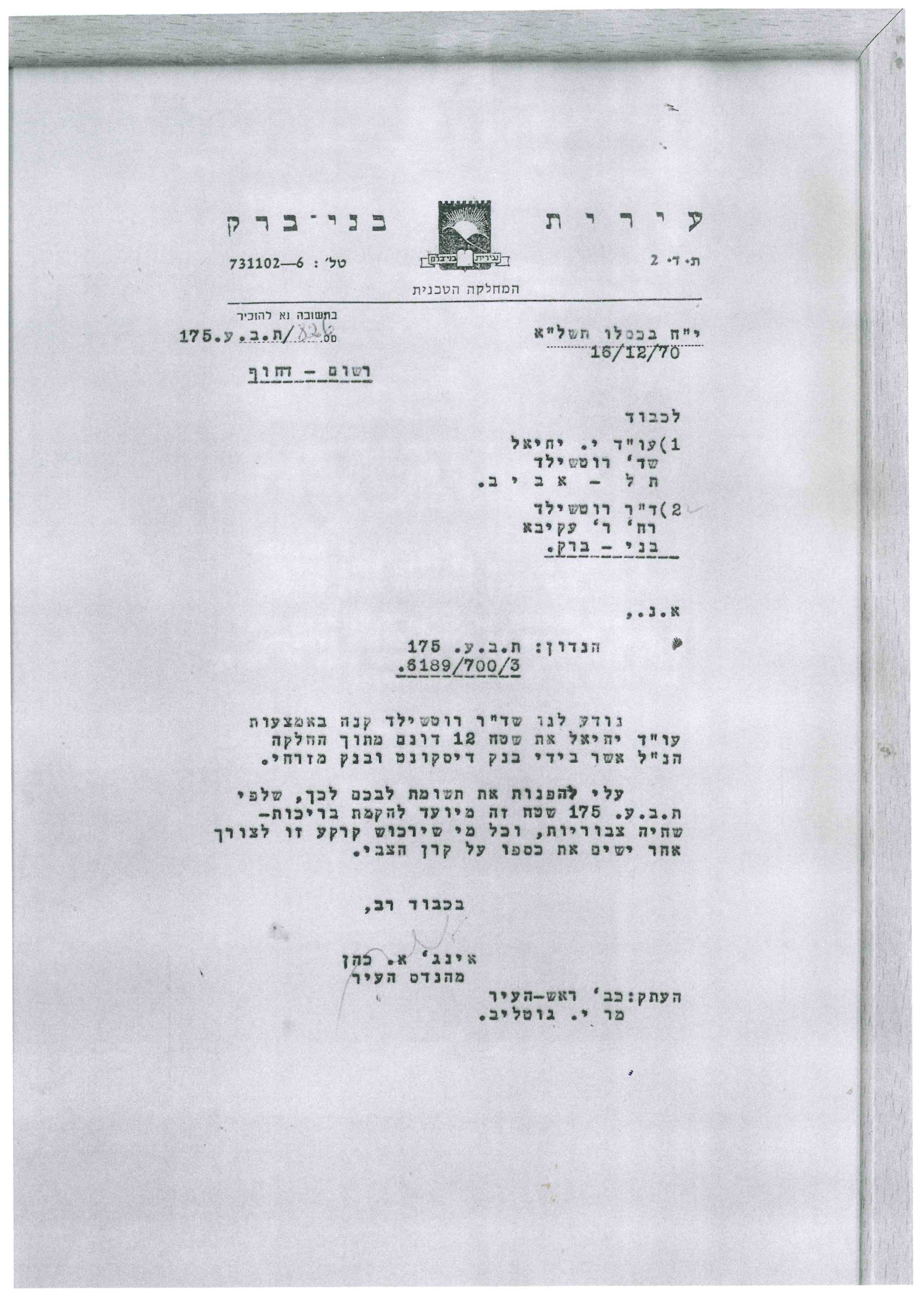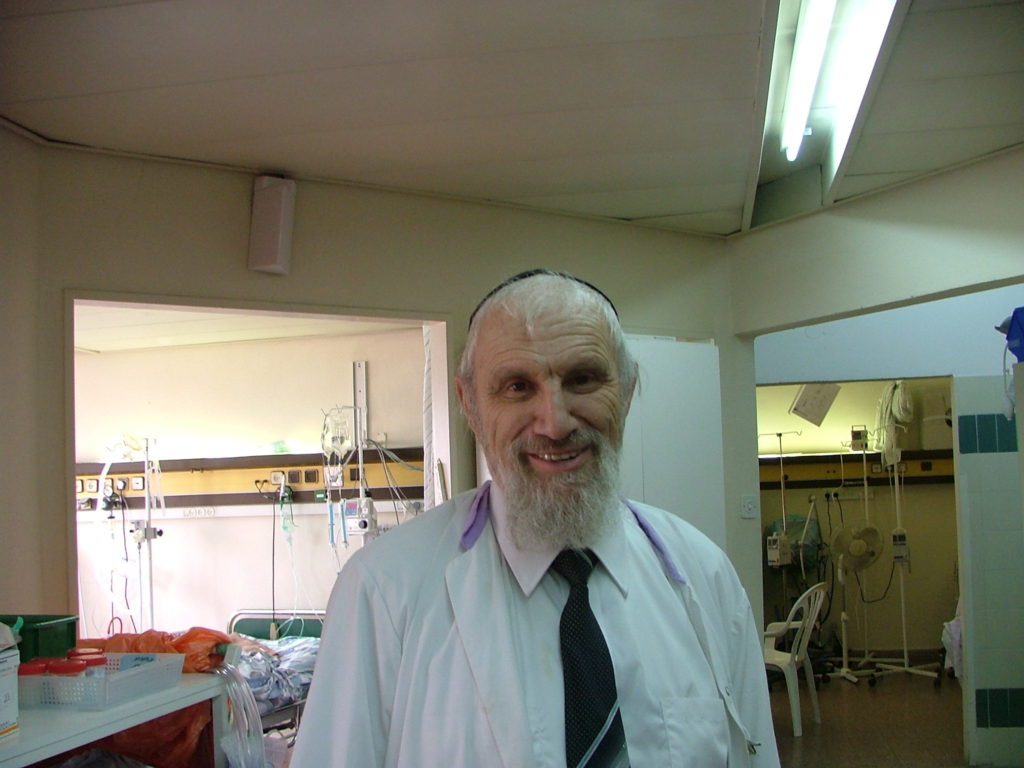by Rabbi Yair Hoffman
YH: Dr. Rothschild z”l, your father, was the founder of Mayanei Hayeshua. What would you say is your father’s greatest legacy?
SR: I would say that his greatest legacies are two – kedushat hachaim and kavod ha’adam. Kavod ha’adam is the idea of treating everyone – regardless of age or health with remarkable respect.
There are many, many hospitals. I am quoting my father now, and this was something he was fond of saying. But MHMC is different – it was built for the value of life. In an average hospital when they come across a person who has reached ninety years of age, the thinking is that he has lived his life. They make neither the effort to extend it nor do they give him the kavod that he deserves.
In MHMC it is the exact opposite.
In this hospital, they treat him like he is a head of government. This was my father’s view on what a hospital should be. Boruch hashem, MHMC is an embodiment of that vision. They do everything – even for chayei sha’ah – the short-term extension of life. Every neshama is very special and this is the view that permeates MHMC. These were his greatest legacies.
YH: You mentioned that you do everything even for chayei sha’ah – don’t the kupat cholim get upset and not approve the reimbursement for these things?
SR: Initially, they gave us a lot of problems. However, when one of the heads of a kupat cholim saw how much we do for every individual, he knew that MHMC was the place to put his father in. Since then, the kupat cholim have come around. What MHMC teaches is the value of life.
YH: Can you describe to me how MHMC has grown over the years?
As a genuine community hospital, what we do here is provide a hospital that meets the communal needs. Originally, the hospital was housed in only one building. Now we are in three buildings.
We have also expanded departments. In the past four years we opened up numerous departments. We just built a psychiatric hospital. We saw that there is a great need for it. We made it very comfortable for the patients and the families. Since our values are the promotion of human dignity, we have made it very special. It is like a hotel – there is an entire building – and in Mayanei Hayeshua’s Mental Health Center there is a separate floor for men and one for women. Once there was never a place for an observant Jew to go. Now there is a place to go and where there is a high rate of cure, boruch hashem.
YH: Can you elaborate on any specific psychiatric disorder where MHMC has made an impact?
SR: It used to be that anorexia was an area that was completely ignored. After a lot of effort, we now have a Day Care Treatment Center for anorexia and hopefully soon will have an entire department dedicated to treating these patients. Anorexia r”l has a 25% mortality rate. If we did not create this, many of these neshamos would be lost, chalilla.
YH: When I am in Eretz Yisroel, I try to attend the shiur that Rav Yitzchok Zilberstein gives to the Rabbonim of hospitals on Thursday evenings. He would relate many of the rulings that Rav Elyashiv zt”l gave on pressing medical issues. Who rules on halachic issues for the hospital?
The hospital has a vaad halacha. It was Rav Vosner zt”l, and lehavdil bain chaim l’chaim, Rav Karelitz and Rav Yitzchok Zilberstein. Before he was niftar, Rav Vosner asked Rav Chaim Kanievsky to become part of the vaad halacha. And it now includes Rav Moshe Shaul Klein, and Rav Soriel Rosenberg the av beis din of Rav Nissim Karelitz’s beis din.
YH: What were some of the original shailos or issues that they paskened on?
At the very beginning, before the hospital was even built, the Rabbonim insisted that it be done in such a way that there would not be any issues of tumas kohanim. A kohain can enter the hospital at any time and it is done in such a manner where there are no shailos or sfeikus.
YH: Who brings the questions to Rav Chaim and rest of the members of the vaad?
SR: At times it is the doctors or specialists themselves. For the hospital, it is either me or Rav Yoseph Hofner, our resident Rav.
YH: What else is unique about MHMC?
SR: The biggest chochma is the combination of the very best in medicine together with the halacha. We have here Professor Agranat a top cardiologist who specializes in catheterization, removing blockages. We have the best Intensive Care Unit in Eretz Yisroel here in Mayanei Hayeshua – led by Professor Sorkine. Our OB/Gyn department is highly respected and it is run by Professor Yossi Lessing. There are many people here with fantastic national and international reputations.
YH: When did your father come to Eretz Yisroel?
He came to Israel from Zurich in 1971. I was the first of the children to be born in Eretz Yisroel.
YH: How many children are there, bli ayin hara?
SR: 17 kids, bli ayin hara.
YH: Tell me about what it was like growing up with your father, the doctor of Bnei Brak.
SR: When I was a child, my father was known as the doctor of Bnei Brak. Our Shabbos seudah was not a Shabbos if we did not have at least one or two or three knocks on the door where someone had a bone stuck in his throat or someone was feeling chest pain and wasn’t sure what it was. When we asked him about all the time he would spend with patients he always answered, “Ki lekach notzarti – this was what Hashem had fashioned me for.”
These words were always on his lips. All the Americans who learned in the Ponovech and Slabodka Yeshivos in Bene Brak would come to him. They knew he was the address for all medical problems or issues – especially with no health insurance. They relied on him.
YH: When did he decide to build the hospital? What was the reaction?
SR: He wanted to from the beginning. He saw the tremendous need. But when he expressed his desire to build a hospital in Bnei Brak – he was called, “the meshugunah.” The truth is that when I came to the health ministry in 2003 and said that we wanted to start a psychiatric outpatient clinic, they also called me a meshuganeh – so I know what he felt like.
He accepted any and all patients, whether they could pay or not. Patients came to see him and after he had treated them they asked what they should pay. He answered, “I am trying to build a hospital here in Bnei Brak. There is a pushka right outside the room, put in it whatever you want.”
YH: Where did he get his inspiration from?
SR: He was very close to the Ponevecher Rav. In fact, he would take him around Europe when he visited. Once, when the two of them were in Rome, there was very heavy snow. He said to my father, “Come, we have to go to the Arch of Titus!”
My father asked, “In this snow?”
The Ponevecher Rav answered, “Yes, come!”
When we arrived at the Via Sacra he looked up at the fifty foot arch and said, “Titus, Titus, you thought to destroy Klal Yisroel. But now we are here building yeshivos. And we will succeed. But where are you? You are in oblivion!”
The Ponevecher Rav’s vision in building his Yeshiva here, inspired my father all his life.
He treated so many Gedolim he was called the doctor of the Gedolim. Among some of his patients were Rav Chatzkel Levenstein zt”l, the Baba Sali zt”l, the Steipler Gaon zt”l. My father was a ben bayis by the Steipler. He also gave him a bracha of hatzlacha in this endeavor. His emunah in Gedolim was unbelievable.
YH: Can you give us a vignette of that?
SR: He once brought a large donor to Rav Shach zt”l. The donor asked if it was worthwhile to give a large donation to the hospital. Rav Shach answered that it would be nice but because of the special circumstances of the donor, it would be much better to donate to the yeshiva. My father came home and announced to the kids and to my mother that he was zocheh to really help out the Yeshiva.
YH: Tell me please, if you will, more about your mother, Mrs. Reitz Rothschild.
SR: My father married my mother when he was 30. She supported his work completely and stood behind him in everything. From the day the hospital was opened she has been visiting with the patients and encourages them and cheers them up. She is an inspiration to us all.
YH: When did MHMC open its doors?
SR: In 1990 – 28 years now.
YH: How many deliveries does Mayanei Hayeshua perform each year?
SR: We have more than 1000 a month. This is the largest venue for Jewish deliveries in the world.
YH: Do you have an American Friends organization?
SR: Yes, we do. It is run by Reb Shmuel Lefkowitz, Reb Efraim Hasenfeld, and Reb Eli Levitin.
YH: Thank you so much for this interview!
SR: Thank you!
The interviewer can be reached at [email protected]
























